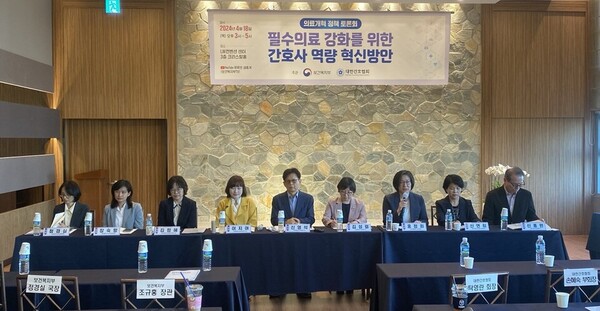The government said Thursday that it would consider including nurses as the beneficiaries of the Special Act on Handling Medical Accidents.
Officials said there is no problem in including nurses in the targets of the law, citing that the draft bill, which was released in February, also stated that its targets were medical professionals, not physicians.

Jeong Kyung-sil, a healthcare policy officer at the Ministry of Health and Welfare, said so at a healthcare reform policy discussion on Thursday, co-hosted by the Ministry of Health and Welfare and the Korea Nursing Association (KNA), on the topic of “Measures to innovate nurses' capabilities to strengthen essential care.”
The remarks came in response to participants from the nursing community, who called for legal protection for specialized nurses who perform doctors’ work and PA (physician assistant) nurses.
In February, the government unveiled a draft of the Special Act on Handling Medical Accidents to placate the medical community, which took collective action against the increase in the medical school enrollment quota.
According to the draft bill, if a medical professional has liability insurance deductible, even if he or she injures a patient due to medical malpractice while practicing medicine, he or she cannot be prosecuted if the patient does not want his or her punishment. A liability insurance deductible is an insurance policy with a set coverage limit.
If a medical practitioner has a comprehensive insurance deductible, law enforcement officers cannot file a prosecution even if he or she injures a patient due to medical malpractice in the course of medical treatment. They cannot file a prosecution even if a patient is seriously injured in the case of essential medical treatment, such as emergency medical treatment, serious illness, and childbirth. Comprehensive insurance deductible refers to insurance covering the full damages incurred.
In addition, if a patient dies while receiving essential medical treatment, the comprehensive insurance deductible will reduce the sentence.
"We are preparing a special law on criminal penalties in conjunction with the insurance system to reduce the burden of criminal penalties and civil lawsuits for medical accidents," Jeong said. “I think (the special law) could be applied to personnel who are actively working in the field, including PA nurses and doctors."
The ministry will discuss with the KNA the consideration of expanding the scope of application of the special law, Jeong said, adding that the draft law says that the targets are medical personnel, so there is room to apply it to PA nurses.
"To improve the training environment for junior doctors and materialize specialist-centered hospitals (which the government is promoting), it is essential to expand the number of PAs and clarify their scope of work," Jeong said. "We will discuss with each profession to institutionalize PA nurses and actively implement their institutionalization."
Nurses call for removing 'temporary' label in nursing-related pilot project
At the panel discussion, some participants argued that strengthening the capacity of nursing personnel, including the introduction of nurse practitioners and PA nurses, is necessary to improve essential medical care.
Professor Kim Sung-reul of the Korea University College of Nursing, who spoke on the topic of “Strengthening Nurse Capacity and Activating Nurse Practitioners in Essential Healthcare,” maintained that activating nurse practitioners is necessary to strengthen essential healthcare and that their institutionalization beyond the current pilot projects related to nurse work is essential.
"Currently, a pilot project for nurse practitioners is underway due to the shortage of doctors (amid the collective action of the medical community), but there is confusion because of the word 'temporary,'" Professor Kim said. "The role of nurse practitioners needs to be clarified through the pilot project and settled within the legal protection system, not a temporary pilot project."
To achieve this, Professor Kim stressed the need for institutional efforts, curriculum reform, systemic support, continuous education programs, and individual efforts.
Regarding institutional support, Professor Kim emphasized the need for a specific scope of practice legislation and a clinical classification system, as well as a compensation system for nurse practitioners.
In the discussion following the presentation, participants also argued that nurses' work capacity should be strengthened to strengthen essential medical care.
"Nurse practitioners support the work of specialists and full-time doctors (in medical institutions), as well as specialists' work. In the current crisis of the absence of specialists, the medical sites where nurse practitioners substitute doctors’ jobs are relatively stable," said Hong Jeong-hee, chief nursing officer at Samsung Medical Center.
Hong noted that as one of the government's healthcare reform plans is a specialist-centered hospital, it is important to actively utilize nurse practitioners with master's education and sufficient clinical experience in the long term to ensure patient safety and medical quality, as well as medical professionals and public trust.
"However, various institutional limitations have so far prevented the expansion of the nurse practitioner system. We hope the ongoing pilot project will improve many aspects of the program, and we need clear legal guarantees after the pilot project," she added.
Shin Yeon-hee, head of the nursing department at Seoul National University Bundang Hospital, said, "It has been two months since the pilot project on nursing work. Since many medical institutions participate in the pilot project, there should be a process to identify and approve actions that are not legally problematic."
There should be a new department (within the government) to coordinate and manage this, and there should also be a position within the healthcare organization to manage the nurse practitioners," Shin added.
Related articles
- Opposition's election victory raises questions on medical student increase policy changes
- Korea to allow terminal patients to stop life-sustaining treatment more flexibly
- Nurses are forced to do physicians' jobs amid escalating healthcare crisis
- 81% of nurses leave hospitals in less than a year; 11% give it up for good
- Lawmaker takes issue with guilty ruling on physician for prescription mistake

